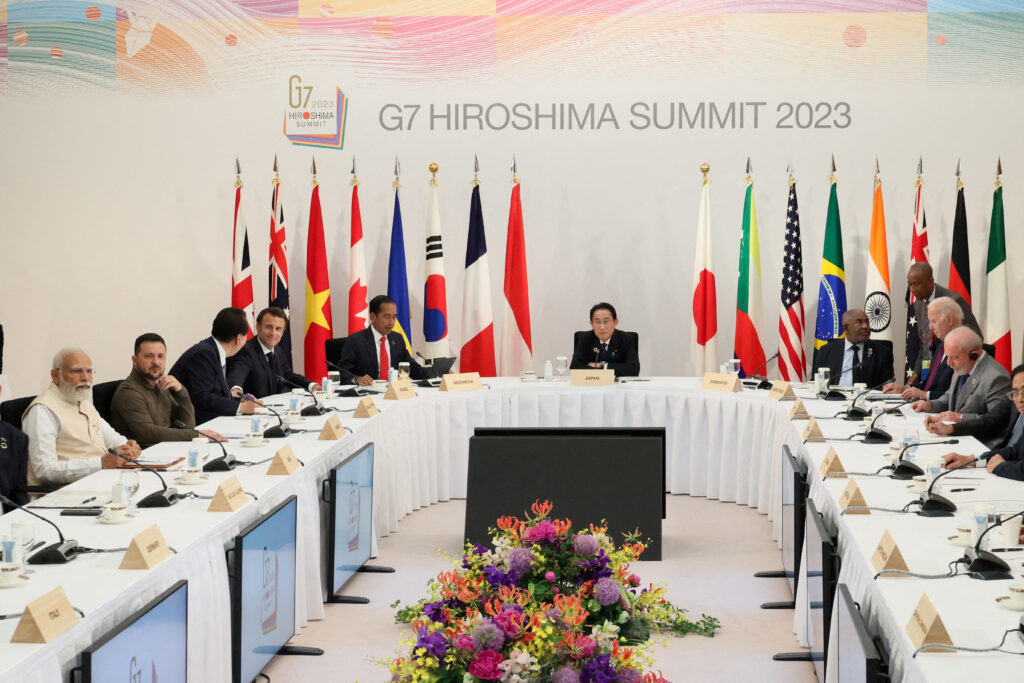
- ARAB NEWS
- 15 Jul 2025

The leaders of the Group of Seven (G7) rich democracies this weekend pledged to “de-risk” without “decoupling” from China, an approach that reflected European and Japanese concerns about pushing Beijing too hard, officials and experts said.
U.S. President Joe Biden and other G7 leaders wrapped up a three-day summit in the Japanese city of Hiroshima on Sunday where they took aim at China over “economic coercion” and said they would reduce exposure to the world’s second-largest economy in everything from chips to minerals.
Differences between G7 members emerged in the run-up to Hiroshima, with the United States calling for targeted controls in investment to China. Germany, France and Japan were all more cautious, given the potential impact on their economies.
The diverging outlook came into sharp focus after French President Emmanuel Macron visited Beijing last month and called for the European Union to reduce dependence on the United States.
But the language of the G7 communique was tempered by pragmatism, with the leaders noting they did not seek to “thwart China’s economic progress and development” and that each country would work in its national interest.
“There are differences among the G7 nations in terms of issues such as the U.S. investment restrictions on China,” a Japanese government official said, speaking on condition of anonymity.
The summit was still able to send a message that transcended those differences, the official said.
As talks continued between G7 members, the language of the communique was “made a little more balanced”, a French presidential official said.
“At the heart of the message we wanted to get across at this G7 was the European position that China is a partner, complements us and is a systemic rival, all presented in G7 language,” the official said.
ANTI-CHINA WORKSHOP
White House national security adviser Jake Sullivan told reporters in Hiroshima the United States would lay out its own approach on outbound investment controls after “full consultations” with G7 partners.
China rebuked the statement and summoned host Japan’s envoy in protest. The state-backed mouthpiece Global Times on Monday called the G7 an “anti-China workshop”.
Separately, China on Sunday said it would block U.S. firm Micron Technology Inc from selling memory chips to key domestic industries, a potential sign of further tension to come.
“The de-risking approach I think was the easiest way for the G7 to reach some consensus moving forward on China,” said Jonathan Berkshire Miller, a director at the Macdonald Laurier Institute, a public policy think tank.
“The language shift indicates that U.S. allies understand the risks of deep economic engagement with China but also realise that a complete severance of economic ties is not realistic.”
Japan, the only Asian member of the G7, arguably has more to lose if China were to retaliate. Last year mainland China was both Japan’s largest export market, at $145 billion, and its biggest source of imports, at $189 billion, IMF data shows.
After the release communique, the leaders themselves largely spoke in measured terms about China.
Biden said he expected a thaw with Beijing “very shortly”, while German Chancellor Olaf Scholz said G7 nations would ensure big investments in China continue even as they pare riskier exposure.
Biden also said the “de-risking” was aimed at ensuring the United States wasn’t dependent on any one country for a necessary product.
“They don’t want to decouple because it’s difficult, it’s a lot of trouble, and it’s not feasible,” said Kunihiko Miyake, research director at the Canon Institute for Global Studies.
“It’s about doing their best to stop any technology and manufacturing technology that would be an issue for security from reaching China,” Miyake said.
There’s also the question of whether Beijing sees a distinction between de-risking and de-coupling.
“It’s not like China will be fine with the idea of de-risking instead of decoupling,” Miyake said.
Reuters